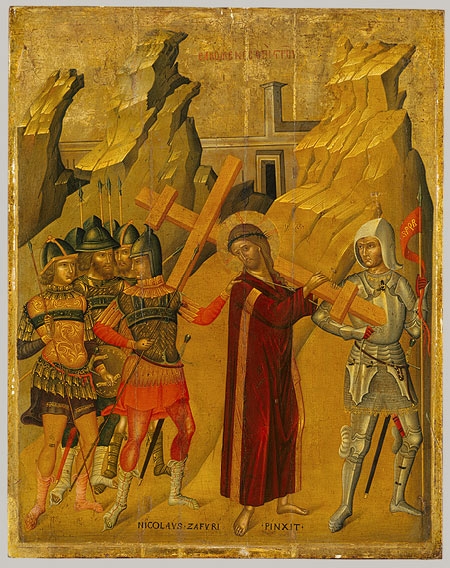Thursday of week 15 in Ordinary Time  Parish of St. Apollinaris, Dusseldorf Readings at MassLiturgical Colour: Green. Year: A(I).
God reveals his name to MosesMoses, hearing the voice of God coming from the middle of the bush, said to him, ‘I am to go, then, to the sons of Israel and say to them, “The God of your fathers has sent me to you.” But if they ask me what his name is, what am I to tell them?’ And God said to Moses, ‘I Am who I Am. This’ he added ‘is what you must say to the sons of Israel: “I Am has sent me to you.”’ And God also said to Moses, ‘You are to say to the sons of Israel: “The Lord, the God of your fathers, the God of Abraham, the God of Isaac, and the God of Jacob, has sent me to you.” This is my name for all time; by this name I shall be invoked for all generations to come. ‘Go and gather the elders of Israel together and tell them, “The Lord, the God of your fathers, has appeared to me, the God of Abraham, of Isaac, and of Jacob; and he has said to me: I have visited you and seen all that the Egyptians are doing to you. And so I have resolved to bring you up out of Egypt where you are oppressed, into the land of the Canaanites, the Hittites, the Amorites, the Perizzites, the Hivites and the Jebusites, to a land where milk and honey flow.” They will listen to your words, and with the elders of Israel you are to go to the king of Egypt and say to him, “The Lord, the God of the Hebrews, has come to meet us. Give us leave, then, to make a three days’ journey into the wilderness to offer sacrifice to the Lord our God.” For myself, knowing that the king of Egypt will not let you go unless he is forced by a mighty hand, I shall show my power and strike Egypt with all the wonders I am going to work there. After this he will let you go.’
The Lord remembers his covenant for ever. or Alleluia! Give thanks to the Lord, tell his name, make known his deeds among the peoples. Remember the wonders he has done, his miracles, the judgements he spoke. The Lord remembers his covenant for ever. or Alleluia! He remembers his covenant for ever, his promise for a thousand generations, the covenant he made with Abraham, the oath he swore to Isaac. The Lord remembers his covenant for ever. or Alleluia! He gave his people increase; he made them stronger than their foes, whose hearts he turned to hate his people and to deal deceitfully with his servants. The Lord remembers his covenant for ever. or Alleluia! Then he sent Moses his servant and Aaron the man he had chosen. Through them he showed his marvels and his wonders in the country of Ham. The Lord remembers his covenant for ever. or Alleluia!
Alleluia, alleluia! My soul is waiting for the Lord, I count on his word. Alleluia!
Alleluia, alleluia! Come to me, all you who labour and are overburdened, and I will give you rest, says the Lord. Alleluia!
My yoke is easy and my burden lightJesus said, ‘Come to me, all you who labour and are overburdened, and I will give you rest. Shoulder my yoke and learn from me, for I am gentle and humble in heart, and you will find rest for your souls. Yes, my yoke is easy and my burden light.’ Christian Art Each day, The Christian Art website gives a picture and reflection on the Gospel of the day. The readings on this page are from the Jerusalem Bible, which is used at Mass in most of the English-speaking world. The New American Bible readings, which are used at Mass in the United States, are available in the Universalis apps, programs and downloads. |




